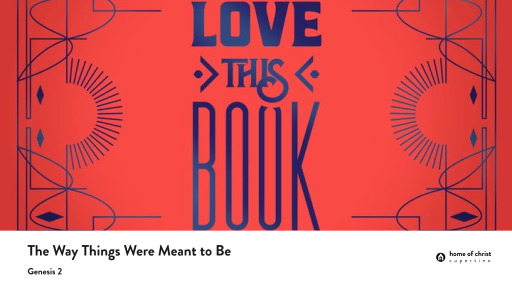The Way Things Were Meant to Be
Notes
Transcript
The Way Things Were Meant to Be
All human work (especially excellent work), done by all people, as a channel of God’s love for his world.
They will be able to appreciate and rejoice in their own work, whether it is prestigious or not, as well as in the
skillful work of all other people, whether they believe or not. So this biblical conception of work—as a
vehicle for God’s loving provision for the world
~Tim Keller
Genesis 2
Gen 1 focuses on Creator God – Elohim, Gen 2 focuses on Covenant God - Yahweh
These are the generations of the heavens and the earth when they were created, in the day that the LORD
God made the earth and the heavens.
Gen 2:4
•
yatsar -to form, fashion, shape, mold. With a purpose, intentionality, deliberately with
forethought.
Then the LORD God formed the man of dust from the ground and breathed into his nostrils the breath of
life, and the man became a living creature.
Gen 2:8
“…breathed, is warmly personal, with the face to face intimacy of a kiss and the significance that this was an act of
giving as well as making; and self-giving at that.”
~Derek Kidner
You have made us for yourselves and our hearts are restless, until they find their rest in you.
~Augustine
What else does this craving, and this helplessness, proclaim but that there was once in man a true happiness,
of which all that now remains is the empty print and trace? This he tries in vain to fill with everything around
him, seeking in things that are not there the help he cannot find in those that are, though none can help,
since this infinite abyss can be filled only with an infinite and immutable object; in other words by God
himself
~Blaise Pascal
.
...I will make him a helper fit for him.
And the LORD God commanded the man, saying, “You may surely eat of every tree of the garden, but of
the tree of the knowledge of good and evil you shall not eat, for in the day that you eat of it you shall surely
die.
Gen 2:16-17
Tree of the knowledge of good and evil represents all of morality, and to eat of it
signifies human autonomy apart from God
The fear of the LORD is the beginning of wisdom, and the knowledge of the Holy One is insight.
Pr 9:10
To flourish in the world through our work
Gen 2:15
Gen 2:18b
This full description of the woman’s creation is unique to the cosmogonies of the ancient Near East. The
Hebrews lofty estimation of womanhood and its place in creation was not widely held by ancient
civilizations, and Israel itself failed at times to give proper recognition and honor to women
~Kenneth Matthews
ezer – helper, ally, one who helps in times of need
I lift up my eyes to the hills. From where does my help come? My help comes from the LORD, who made
heaven and earth.
Ps 121:1-2
kenegdo – suitable, fit, complementary, corresponding
Next Steps:
•
He has made everything beautiful in its time. Also, he has put eternity into man's heart, yet so that he
cannot find out what God has done from the beginning to the end.
Ecc 3:11
The LORD God took the man and put him in the garden of Eden to work it and keep it.
Gen 2:18a
Christianity means community through Jesus Christ and in Jesus Christ. No Christian community is more
or less than this.
~Bonhoeffer
God’s intent for us :
• To flourish in our relationship with Him
•
To flourish in relationship with one another
Then the LORD God said, “It is not good that the man should be alone…
•
•
Take time this week with God, reading his Word, meditating on it, and responding
in faith to what He is asking you to do. Share that decision with one other
person.
Examine how you view your work. Do you see it through the lens of God?
Consider how God is using your work for his glory and for your flourishing.
Spend time in community with others, but get beyond the superficial.
Remember that the only community we have is in Christ, sharing our own
brokenness with one another, and praying with and for each other.
Additional Resources:
• “Every Good Endeavor: Connecting Your Work to God's Work” by Tim Keller
• “The Mystery of Marriage” by Mike Mason
• “Life Together” by Dietrich Bonhoeffer

